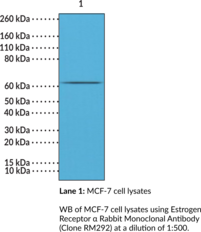Territorial Availability: Available through Bertin Technologies only in France
- Correlated keywords
- AF1 ESR-1 Hsp-90 PI3-K P-I3K PI-3K NF?B RM-292
- Product Overview:
Estrogen receptor ? (ER?) is a member of the nuclear receptor superfamily of transcription factors encoded by ESR1 in humans that has a key role in reproductive function and additional roles in cancer progression and inhibition.{59658,59659,59660} Alternative splicing of the ESR1 pre-mRNA produces one full-length 66 kDa isoform and two short-length 46 and 36 kDa isoforms, which contain truncated C-termini.{59660} ER? is comprised of an N-terminal domain that contains AF-1, which is critical for the transactivation function of ER?, a DNA-binding domain that recognizes estrogen response elements (EREs) on target genes, and a C-terminal ligand-binding domain (LBD) that contains the nuclear localization signal.{59659,59658} ER? is widely expressed in numerous tissues, including breast, prostate, uterus, liver, and bone, and localizes to the cytoplasm in a complex with heat shock protein 90 (Hsp90).{59660,59659} Upon estrogen stimulation, ER? dissociates from Hsp90, dimerizes, and translocates to the nucleus, where it binds EREs expressed by target genes encoding proteins that activate numerous signaling pathways, including ERK/MAPK, PI3K/Akt/mTOR, and NF-?B, and influence a variety of cellular processes, including reproductive function, bone homeostasis, and inflammation, as well as tumor progression and metastasis.{59659,59658} ER? is overexpressed in more than 50% of patients with breast cancer, but is associated with improved prognosis, whereas loss of ER? is a feature of triple-negative breast cancer (TNBC) and is associated with resistance to hormonal therapy.{59661} Cayman’s Estrogen Receptor ? Rabbit Monoclonal Antibody can be used for immunohistochemistry (IHC) and Western blot (WB) applications.
Cayman Chemical’s mission is to help make research possible by supplying scientists worldwide with the basic research tools necessary for advancing human and animal health. Our utmost commitment to healthcare researchers is to offer the highest quality products with an affordable pricing policy.
Our scientists are experts in the synthesis, purification, and characterization of biochemicals ranging from small drug-like heterocycles to complex biolipids, fatty acids, and many others. We are also highly skilled in all aspects of assay and antibody development, protein expression, crystallization, and structure determination.
Over the past thirty years, Cayman developed a deep knowledge base in lipid biochemistry, including research involving the arachidonic acid cascade, inositol phosphates, and cannabinoids. This knowledge enabled the production of reagents of exceptional quality for cancer, oxidative injury, epigenetics, neuroscience, inflammation, metabolism, and many additional lines of research.
Our organic and analytical chemists specialize in the rapid development of manufacturing processes and analytical methods to carry out clinical and commercial GMP-API production. Pre-clinical drug discovery efforts are currently underway in the areas of bone restoration and repair, muscular dystrophy, oncology, and inflammation. A separate group of Ph.D.-level scientists are dedicated to offering Hit-to-Lead Discovery and Profiling Services for epigenetic targets. Our knowledgeable chemists can be contracted to perform complete sample analysis for analytes measured by the majority of our assays. We also offer a wide range of analytical services using LC-MS/MS, HPLC, GC, and many other techniques.
Accreditations
ISO/IEC 17025:2005
ISO Guide 34:2009
Cayman is a leader in the field of emerging drugs of abuse, providing high-purity Schedule I-V Controlled Substances to federally-licensed laboratories and qualified academic research institutions for forensic analyses. We are certified by ACLASS Accreditation Services with dual accreditation to ISO/IEC 17025:2005 and ISO Guide 34:2009.





